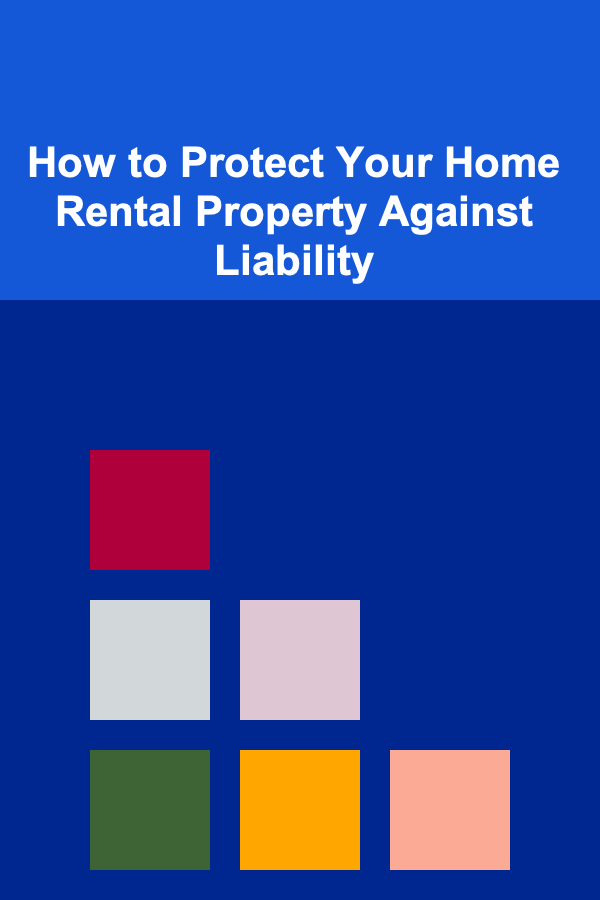
How to Protect Your Home Rental Property Against Liability
ebook include PDF & Audio bundle (Micro Guide)
$12.99$8.99
Limited Time Offer! Order within the next:

Owning a rental property comes with great responsibility. Not only do you have to ensure your tenants are happy and paying rent on time, but you also need to protect your property against various liabilities. Liability issues can arise unexpectedly and, in some cases, can lead to costly legal battles or even the loss of your property. Whether you're a first-time landlord or a seasoned property owner, protecting your rental property against liability is a crucial part of being a responsible and successful property owner.
This article delves into various aspects of liability protection for home rental properties. From understanding the types of liability risks, implementing preventive measures, and obtaining the right insurance to creating clear rental agreements, we'll cover the essential steps to minimize the risks and ensure your investment remains secure.
Understanding the Different Types of Liability Risks
Before you can effectively protect your rental property, it's important to first understand the different types of liability risks that could arise. As a landlord, your responsibilities extend beyond just ensuring the rent is paid. You also have a duty of care to protect your tenants from harm, maintain the property in safe condition, and ensure that the terms of the lease agreement are honored. There are several types of liability risks that landlords should be aware of:
1.1. Premises Liability
Premises liability refers to the responsibility landlords have to maintain safe and habitable living conditions for tenants. If a tenant or visitor is injured on your property due to negligence (such as poor maintenance or unsafe conditions), you could be held liable for their injuries. For example:
- Slips and falls: If a tenant or visitor slips on a wet floor, uneven pavement, or poorly maintained stairs, the landlord may be held responsible for the accident.
- Structural issues: Issues like faulty wiring, broken handrails, or collapsed ceilings can cause injury or death. If you're aware of these hazards but don't take action, you could be held liable.
1.2. Fire Hazards
Fire hazards are another significant liability concern for landlords. If the property is not equipped with functioning smoke detectors, fire extinguishers, or fire exits, and a fire breaks out, tenants could be put at risk. Not only could you face legal consequences, but the lack of fire safety measures could make you liable for injuries, death, or property damage caused by a fire.
1.3. Environmental Hazards
As a landlord, you may be exposed to liability related to environmental hazards, such as lead paint, mold, and asbestos. If your rental property is old and has lead-based paint, it's important to inform tenants and take the necessary steps to mitigate the risks. Similarly, mold and asbestos can pose serious health risks to your tenants, and failure to address these issues can lead to liability claims.
1.4. Personal Injury Claims
In addition to injuries caused by poor maintenance or fire hazards, landlords can also face liability if a tenant or visitor is injured due to a lack of proper security. For example, inadequate lighting in parking areas, broken locks, or poor fencing can create an unsafe environment, leading to personal injury claims from tenants or guests.
1.5. Discrimination or Fair Housing Violations
Discrimination claims can arise if a tenant believes they were treated unfairly during the leasing process. Fair housing laws protect tenants from discrimination based on race, religion, gender, nationality, disability, or familial status. As a landlord, it is important to ensure that you are in full compliance with the Fair Housing Act to avoid potential lawsuits and penalties.
1.6. Wrongful Eviction
Wrongful eviction occurs when a landlord attempts to evict a tenant without proper legal procedures or cause. This can include failing to provide appropriate notice or evicting a tenant based on discriminatory reasons. Wrongful eviction claims can be costly, both financially and reputationally, so it's important to follow the proper legal process if you need to remove a tenant from your property.
Implementing Preventive Measures to Avoid Liability
Now that we understand the various types of liability risks associated with home rental properties, let's discuss the preventive measures you can take to mitigate these risks.
2.1. Regular Property Inspections and Maintenance
One of the most effective ways to protect your rental property from liability is through regular inspections and maintenance. As a landlord, you are legally obligated to keep the property in a safe and habitable condition. Failing to perform routine maintenance or address minor issues before they become serious problems can result in injury or property damage, leaving you liable.
a. Create a Maintenance Schedule
Establish a routine maintenance schedule to inspect various components of your property. This should include:
- Electrical systems: Check for faulty wiring, exposed outlets, or any other electrical hazards.
- Plumbing: Inspect for leaks, clogged drains, or water damage that could lead to slips or mold growth.
- Stairways and handrails: Ensure that stairs and handrails are sturdy and free from defects.
- Smoke detectors and fire extinguishers: Test smoke detectors regularly and ensure that fire extinguishers are in working order.
b. Addressing Issues Promptly
If a tenant reports an issue (such as a broken window, faulty lighting, or a leaky faucet), address it promptly. Delaying repairs can increase the likelihood of accidents or injuries, making you liable.
2.2. Install Safety Features
Incorporating safety features into your rental property is essential to protect your tenants and reduce liability risks. Consider the following safety measures:
- Smoke and carbon monoxide detectors: These are required by law in most areas. Ensure that detectors are installed in all appropriate rooms and are functioning correctly.
- Fire escapes and exits: Make sure that tenants have easy access to fire escapes and exits in case of an emergency.
- Lighting: Ensure that all walkways, staircases, and parking areas are adequately lit to prevent accidents.
- Gated entrances and security systems: Depending on the location and nature of your property, installing a security system or gates can prevent break-ins and reduce liability for personal injury claims.
2.3. Address Environmental Hazards
As mentioned earlier, environmental hazards like mold, lead paint, and asbestos can expose you to liability. Here's how to deal with these issues:
- Lead Paint: If your property was built before 1978, it may contain lead-based paint. Under the law, you must disclose the presence of lead-based paint to potential tenants. If you suspect lead-based paint is present, consider hiring a professional to remove or remediate it.
- Mold: Mold growth can lead to health problems for your tenants. If you find mold in your property, it's essential to address the source of the moisture (such as leaks) and clean up the mold. Regularly inspect areas prone to mold, such as basements, bathrooms, and kitchens.
- Asbestos: If your property was built before the 1980s, it may contain asbestos materials. Have the property inspected for asbestos and take necessary steps to manage or remove it.
2.4. Clear and Compliant Lease Agreements
A well-drafted lease agreement is crucial for protecting both you and your tenants. It should clearly outline the terms of the rental, including rent payment schedules, maintenance responsibilities, and rules regarding property use. Having a strong lease agreement can also help protect you from liability in cases of tenant disputes.
Some important clauses to include in the lease agreement:
- Maintenance responsibilities: Specify whether the tenant is responsible for certain repairs (such as changing light bulbs) or if you will handle all maintenance issues.
- Tenant's obligation to report issues: Include a clause that requires tenants to report any maintenance issues or safety concerns immediately.
- Insurance requirements: Consider including a clause that requires tenants to maintain renters' insurance, which can help protect both parties in the event of property damage or loss.
2.5. Compliance with Local Laws
Each jurisdiction may have different laws and regulations regarding landlord-tenant relationships. Staying in compliance with these laws is essential to avoid liability. This includes understanding fair housing laws, tenant rights, and eviction procedures.
Make sure you are familiar with:
- Local housing codes: These codes dictate the minimum standards for habitability and safety. Ensure that your property meets these requirements.
- Fair Housing Act: This law prohibits discrimination based on race, color, religion, sex, nationality, familial status, or disability. Make sure your rental practices comply with these regulations.
- Eviction laws: Understand the legal processes involved in evicting a tenant to avoid wrongful eviction claims.
Obtaining the Right Insurance Coverage
Insurance is one of the most important tools for protecting your rental property against liability. There are several types of insurance coverage that landlords should consider:
3.1. Landlord Insurance
Landlord insurance is specifically designed to protect rental properties. It typically covers:
- Property damage: Coverage for damage to your property caused by fire, vandalism, or natural disasters.
- Liability: Protection in case a tenant or visitor is injured on your property.
- Loss of rental income: Compensation for lost rental income if your property becomes uninhabitable due to damage.
3.2. Renters' Insurance
While landlord insurance protects your property, renters' insurance protects your tenants' personal belongings. It's a good idea to require tenants to maintain renters' insurance as part of their lease agreement. This can help protect them against personal property damage and reduce the likelihood of liability claims against you.
3.3. Umbrella Insurance
Umbrella insurance provides additional liability coverage beyond the limits of your standard landlord insurance. If you face a major liability claim (such as a lawsuit), umbrella insurance can provide extra protection to cover legal fees, medical expenses, and other costs.
Conclusion
Protecting your home rental property against liability is crucial for both your financial stability and the well-being of your tenants. By understanding the various types of liability risks, implementing preventive measures, maintaining comprehensive insurance coverage, and ensuring legal compliance, you can significantly reduce the risks associated with renting out your property. By taking a proactive approach to liability protection, you can safeguard your investment and foster a positive and safe living environment for your tenants.

Essential Tips for Successful DIY Home Repairs and Improvements
Read More
How to Make a Checklist for Introducing Your Product to New Customers
Read More
How to Make Your Bathroom Festive for the Holidays
Read More
How to Soundproof Your Home's Attic for Better Insulation
Read More
How to Use Personal Training Certification to Make Money
Read More
Why You Should Create a Homework Station for Kids
Read MoreOther Products

Essential Tips for Successful DIY Home Repairs and Improvements
Read More
How to Make a Checklist for Introducing Your Product to New Customers
Read More
How to Make Your Bathroom Festive for the Holidays
Read More
How to Soundproof Your Home's Attic for Better Insulation
Read More
How to Use Personal Training Certification to Make Money
Read More